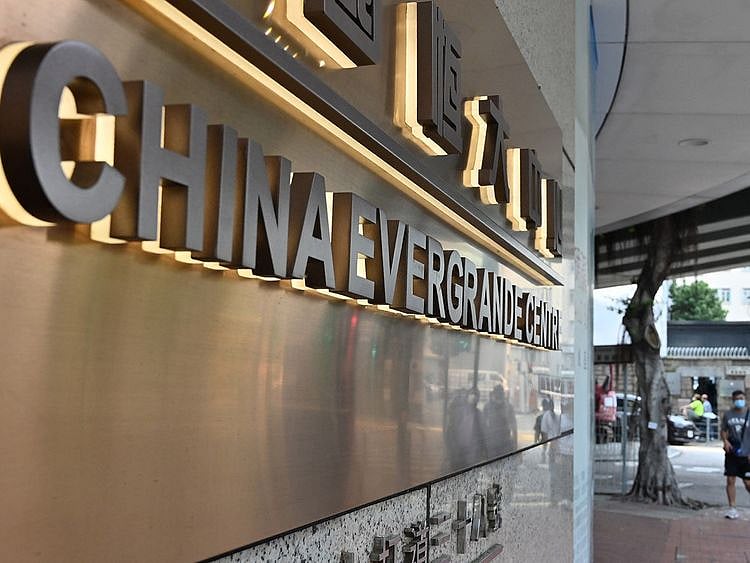Also In This Package
Dubai: China Evergrande Group’s debt crisis might not be China’s “Lehman moment” but it has sent ripples through stocks tied to the developer and the world’s second-biggest economy.
Creditors, investors and suppliers of the embattled firm and its peers are top on traders’ impact list. Next up are companies with sizable revenue from China, also in the spotlight due to the nation’s ongoing regulatory clampdown. Industrial stocks are a key focus for U.S. market watchers while those in Europe are looking at miners.
Fears that an Evergrande collapse might spark financial contagion and curb growth in the Chinese economy roiled global markets on Monday. That anxiety moderated after the developer agreed to settle some local note interest payments but the problem is far from over with dollar bond holders yet to receive a coupon due.
Here are some of the stocks and sectors in traders’ sights:
Property peers
Evergrande’s size coupled with Beijing’s tighter scrutiny of the real-estate sector will continue to have a significant bearing on property developers. The company has about 2 trillion yuan ($310 billion) in assets - equivalent to 2 per cent of China’s gross domestic product, according to Goldman Sachs Group Inc. calculations, so any disposals could well disrupt the market.
Regardless of what happens to Evergrande, China’s home prices are now at risk of “meaningful downside,” Citigroup Inc. says.
The Hang Seng Property Index dropped to its lowest in five years earlier this month. The 12-member gauge include Country Garden Holdings Co., which lost 25 per cent since March-end, and China Overseas Land & Investment Ltd., which fell 16 per cent.
Lenders and investors
Shares of companies that have lent money to or invested in Chinese real-estate firms will remain volatile as traders mull the potential for a spike in bad loans and asset write-downs.
While policy makers are expected to provide support, some banks may become victims, Citigroup analysts including Judy Zhang wrote in a note on Wednesday.
Citi’s analysis of Chinese banks’ loan exposure to high-risk developers suggests credit risk is highest for China Minsheng Banking Corp., Ping An Bank Co. and China Everbright Bank Co. It sees Bank of Nanjing Co., Chongqing Rural Commercial Bank Co. and Postal Savings Bank of China Co. as less vulnerable.
China Banks Downplay Risks After Evergrande Missed Payments
While Chinese insurers have factored in concerns about potential impairment losses, PICC Group’s enterprise value would be hit most among mainland-listed insurance companies in a worst case scenario. That’s followed by Ping An Insurance Group Co., according to Citi’s Michelle Ma in a note on Thursday.
Asian suppliers
Suppliers of building materials and appliances to Evergrande’s projects will be closely scrutinized to assess how much the indebted property developer owes them and what its rise and fall may mean for recurring earnings.
Shares of Evergrande units such as Evergrande Property Services Group Ltd. - which have halved this year - and China Evergrande New Energy Vehicle Group Ltd. - which are down over 90% - also remain on watch.
US Industrials
Any restructuring that weighs on the world’s second-largest economy will have ripple effects through the most economically-sensitive and globalized stocks in America. Industrial firms, often seen as bellwethers for the U.S. economy’s health, may take the hardest hit.
U.S. industrial manufacturers have an around 10% of sales exposure to China, according to estimates from JPMorgan Chase & Co. analyst Stephen Tusa. Stocks to watch include General Electric Co., Otis Worldwide Corp. and Honeywell International Inc., as well as heavy construction and equipment maker Caterpillar Inc.
European miners
In Europe, Evergrande’s crisis is reverberating across the basic materials stocks.
China accounts for 62% of revenue at BHP Group Plc., 58 per cent at Rio Tinto Plc, and nearly half at Anglo American Plc and Glencore Plc, according to data compiled by Bloomberg. Cement makers like HeidelbergCement AG, as well as building suppliers including Kone OYJ and Schindler Holding AG, may be directly affected by the Evergrande fallout, according to strategists at Liberum.
Sign up for the Daily Briefing
Get the latest news and updates straight to your inbox
Network Links
GN StoreDownload our app
© Al Nisr Publishing LLC 2026. All rights reserved.
